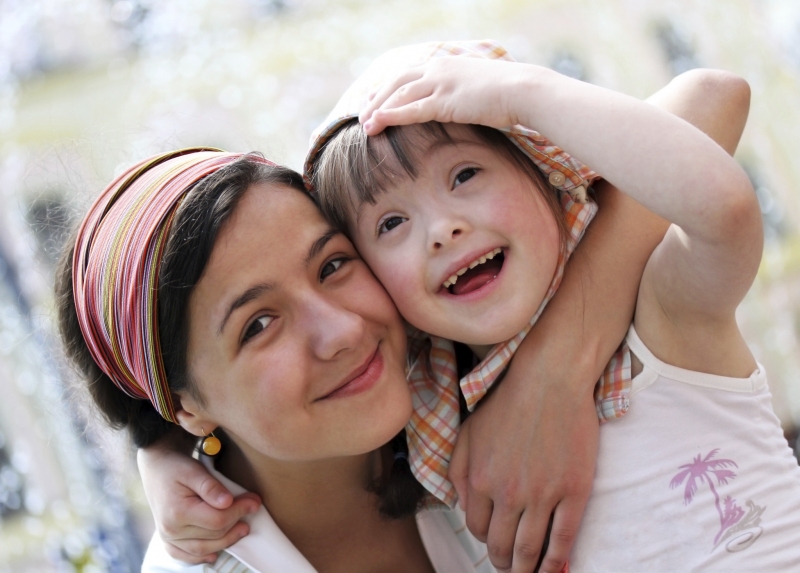Down syndrome is the most commonly occurring chromosomal condition in the United States, affecting approximately one in 700 babies. Despite its frequency in our population, many myths about Down syndrome persist. “Assumptions are changing and lessening with time,” says Dria Law, co-chair of Knowledge & Information for Individuals with Down Syndrome (KIIDS) in Bellmawr, NJ. Read on to learn the medical facts of the condition, and some persistent myths.
Facts
Down syndrome, also called Trisomy 21, occurs when there is a full or partial copy of the 21st chromosome. People with Down syndrome have a predisposition to certain medical conditions. According to Alison Downes, MD, a developmental pediatrician at Children’s Hospital of Philadelphia, children with Down syndrome share some physical characteristics, such as a flattened mid-face, a short stature and slanting of the eyes and ears. They may experience thyroid abnormalities, congenital heart defects, hearing and vision problems and gastrointestinal issues. There is also a range of intellectual disability. “It varies from mild to moderate to severe or profound,” says Dr. Downes.
Myth: Babies with Down syndrome are only born to older mothers.
Fact: Most babies are born to women younger than 35.
Mothers older than 35 have a greater likelihood of having a child with Down syndrome, says Lauren Camp, executive director of the Down Syndrome Association of Delaware. However, more Down syndrome babies are born to mothers younger than 35. “We have parents of all ages in our group,” says Elaine Scott, president of the Chester County Down Syndrome Interest Group based in Exton, PA. Parents are as young as 21, but the average age of new parents in the group is 30 to 32, she estimates.
Myth: Kids with Down syndrome are always happy.
Fact: They experience the emotions that all children do.
“The most common myth that we hear is that they’re always sweet and happy,” says Law. However, parents report that kids with Down syndrome experience the same frustrations and tantrums that other kids do. “Every child is an individual,” says Dr. Downes. “They are likely to get temperament traits from their parents.”
Myth: Kids with Down syndrome are always sick.
Fact: With good health practices, people with Down syndrome can lead healthy lives.
“There is an increased risk for immunodeficiency which means greater risk for infection,” says Dr. Downes. However, despite some sniffles and respiratory infections, kids with Down syndrome can lead healthy lives. “My son has been incredibly healthy his whole life,” says Anne Sproll, mother to 25-year-old Nicholas and a longtime employee of the Camphill Special School in Glenmoore, PA. “With the right nutrition and the right support,” says Sproll, “they do just fine.”
Myth: Kids with Down syndrome must go to special schools.
Fact: 70% of kids are in typical classes.
“Within the past 20 or 30 years, there has been a big push for inclusion,” Camp says. Students with Down syndrome get the same material as the other students, with some additional support, she says. “A lot of literature says that they are more successful in a typical environment,” explains Dr. Downes; this is because interactions with peers allow for modeling of social skills and language.
Myth: People with Down syndrome are unable to form close interpersonal relationships.
Fact: They definitely have very close friendships and they value them.
Kids with Down syndrome have a mild to moderate intellectual disability and this impacts interpersonal relationships, says Law; but, she adds, they socialize, date and have meaningful friendships. “My daughter has the same desires,” says Scott, mom to 20-year-old Emily. “The desire to be with her peers, to text and to be on social media.”
Children with Down syndrome have a wide range of strengths and weaknesses, just like any developing child does. Scott likes to spread this message: “Individuals with Down syndrome are more like you and me than commonly assumed.”
Dr. Downes agrees: “We consider kids with Down syndrome the same as we would other kids. That is, as individuals.”
by Suzanne Koup-Larsen
Originally posted on http://www.metrokids.com/MetroKids/SpecialKids/Down-Syndrome-Myths-and-Facts/
















Leave a Reply